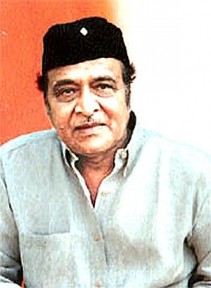The other day while watching Kalpana Lajmi’s unsung, little cinematic ballad Ek Pal, I was amazed at how seamlessly Bhupen Hazarika’s voice wrapped itself around sprawling tea estates, gracious bungalows and the heart of its protagonist Priyam (Shabana Azmi) as she falls into a self-destructive passion for the frivolous Jeet Barua (Farooque Sheikh). Hazarika’s voice flowed through Priyam’s impetuous girlhood, first heartbreak, marriage, loneliness and self-discovery almost like a deep, fathomless, golden river. My most favourite Hazarika song in the film is the wedding ditty Zara Dheeme Zara Haule where Priyam wrapped in a beautiful bridal saree is marrying Ved Hazarika (Naseeruddin Shah) while Jeet, oblivious to the storm within her, is playing the enthusiastic yet detached guest.
There was a certain sinuous resonance in Hazarika’s voice that defied the cliches of Hindi film music as he brought with him the freshness of a region unrepresented in mainstream cinema. His voice smelt of a culture we have never really exerted ourselves to discover. What is incredible is that he chose to root himself in his own culture as a folk balladeer even though he had earned a Ph.D. from Columbia University in New York in 1952 and a Fellowship from the University of Chicago to study cinema as an educational tool of change. The impact of American folk music on contemporary culture inspired him to use Assamese folk music for similar ends. The turning point was his encounter with singer and activist Paul Robeson whose classic Old Man River became another cult favourite O Ganga Behti Ho, in Hazarika’s hands.
He dabbled with politics too but it was his music that he finally and unmistakably became known for. He was prodigiously, undeniably gifted as a musician, lyricist and singer. Rudaali, possibly Kalpana Lajmi’s most celebrated work would not have been half as resonant without Dil Hoom Hoom Kare. Without the voice that thundered like a rain cloud through the narrative, speaking of unbearable loss, stifled angst and a pain that was as uplifting as it was searing. He gave Assamese folk music a global presence by creating lyrical narratives (almost 1,500) that even without Lajmi’s cinematic representations, stood strong and proud on their own.
His most rewarding collaboration, personal as well as creative was with film maker Kalpana Lajmi who along with lyricist Gulzar played a key role in mainstreaming Hazarika’s music.With his passing, we have lost a certain kind of literary, politically aware, socially sensitive musical personality who was deeply connected to the innocence of folk traditions as well as to the universality of global music. Flow on, Bhupen Da. Eternity awaits.







 with
with
This is a beautifully written piece. I had the privilege of meeting Bhupen Hazarika quite a few times during my time in India and during one of his visits to the states. It was a delight.